Seventy years ago, Palestinians suffered the Nakba, or catastrophe, when most fled or were forced by Zionist militias to flee Palestine to make room for the creation of the state of Israel and ensure a Jewish majority. Some 750,000 ended up as refugees registered with the United Nations. Many others fended for themselves. They were never allowed to return to their lands or homes which were confiscated by the nascent state, and many of their villages were subsequently destroyed. Here – and here, from outside Palestine – survivors tell their stories.

Boulos Khoury, 84. Haifa. Originally from Iqrit near the Lebanon border.
Iqrit was a small Christian village of around 500 inhabitants very close to Palestine’s border with Lebanon. The village was ethnically cleansed in 1948 and destroyed in 1951, except for the church. Its villagers became internally displaced – what Israel called “present absentees.”
We were happy. We had figs, hummus and olive trees. We planted everything, except sugar and rice. My father had a lot of land, around 100 dunums. We made flour, grew lentils and beans, all kind of vegetables and olives. The only thing that my father sold was tobacco. He died when I was very young, and my older brother was left in charge. Our home was made of big stones and had been built by my grandfather.
In 1948, there was no resistance in the village. The Zionist forces entered the village and we raised the white flag. We did not have any weapons. They told us to flee to al-Rama and said it would be only for two weeks, and that it was for our own safety. We were transported by military trucks. But I did not go with the rest. My brother told me to go to Lebanon to Qouzah, to our aunt, in order to save the animals. I walked to Lebanon with five cows, a camel, a donkey and a horse. I waited for the message that my brother was supposed to send when they were back in Iqrit, but the message never came.
After one month, I heard that some people were going to Iqrit to pick fruit so I decided to go. I was afraid to cross the border but I made it. There was nothing left in our home, everything had been stolen. People I met told me I could not reach al-Rama, so I went back to Lebanon and stayed for two years. Then I found a smuggler, Ali, and with a group, we left at night for Palestine. We were afraid, it was dangerous. Finally at dawn, close to al-Rama, I continued alone through the fields. When I reached the village, I saw someone from Iqrit who took me to my family. They could not believe I had made it. Neither could I.
One Christmas Day we heard that Iqrit had been completely destroyed. The mukhtar and others had gone to a hill opposite the village and confirmed the news. It was a catastrophe to hear this news. They wanted to kill any hope for us to go back. But they didn’t.
I eventually got a permit and started to work as a butcher in Haifa. I married in 1960 and moved to Haifa. We go back a lot to Iqrit, sleeping in the church. I was arrested a few times for staying there. We brought the children during every vacation.
We are the same as the refugees. What we have in common is the hope of return. We just want to go home, this is our basic right. I want to go back and build a small home.
Reportage and photo by Anne Paq

Saed Hussein Ahmad al-Haj, 85, Balata refugee camp, in the city of Nablus in the occupied West Bank. Originally from al-Tira near Ramla.
I was lucky compared to other refugees. I was successful in work and have three butcher shops. I have children. But there has always been something missing. I keep myself busy but there is no real joy because I do not live in the home where I was born.
My village was mostly known for its livestock and its produce. It was a small village, around 2,000 inhabitants. Our life was simple life back then. The school was so basic we sat on the floor. I spent my time playing outside with the neighbors.
My father traded in sheep and cattle. He also sold their milk. We had a small house made of stones, and two dunums of land that were cultivated with wheat, sesame, figs and olive trees. Everything tasted better back then. We ate directly from the land. We could also easily go to the sea, and because of the trade we met different kinds of people.
In 1948, I was around 15. One night we saw soldiers coming toward us. First we thought they were Arab. But then they started shooting. The bullets were flying over my head and I thought I would die. I ran back to my father, who told me to go east with the sheep. We had six then. I went alone but I heard shooting so I left the sheep and ran back home.
We fled with the rest of the villagers. First we went to al-Abbassiyya where they were some Palestinian resistance groups. Then we walked to Deir Ammar near Ramallah.
We took nothing with us. Everyone was talking about Deir Yassin [where Zionist forces had committed a massacre]. The fear got into us even before the Zionists arrived. We should have stayed and died there. We should have fought. At least, we never sold our homes. We were kicked out against our will.
A few days after we fled, I sneaked into the village at night. But when I entered our home, everything – the flour, the olive oil, the furniture – was destroyed and strewn in the middle.
We went back to our village, once, with my father. It was after 1967. He knocked at the door, and a Yemeni answered. My father told him: “This is my home.” But the Yemeni just answered: “It was your home. Now it is mine.”
Reportage and photo by Anne Paq
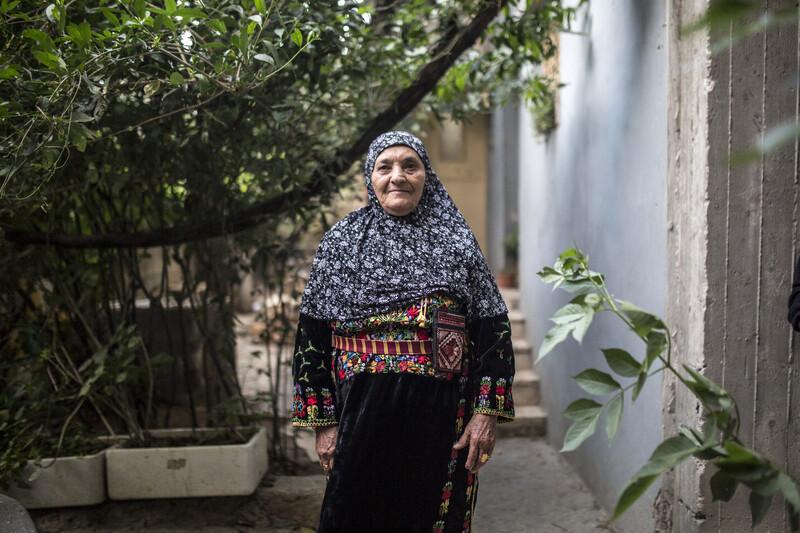
Wafta Hussein Khleif, 82, Dheisheh refugee camp in the occupied West Bank city of Bethlehem. Originally from Deir Aban, near Jerusalem.
All of Wafta’s male children have been arrested by Israel at one time or another, and one spent more than 20 years in prison. One of her grandchildren was killed during an Israeli army incursion in Bethlehem in 2008. He was 17.
We ate what we grew. Everything came from the soil. We bought nothing. We lived in a farm that had an inside courtyard. We had more than a dunum of land with 200 olive trees, and chickens and sheep. There were Jews living nearby. They were friends and would come to the village to buy milk. They also did not have a mill so they used the one in our village.
In 1948, there was a lot of fighting. There were shootings and bombings from planes. We did not have any weapons, just knives and scythes. We digged a trench around the village. Three were killed during those days. When we heard about the massacre in Deir Yassin, how they lined up the men and shot them, it was too much. They were taking the girls too. That’s when we left. If you were in our place, what would you have done?
There was no time. We took what we could carry. My grandfather Hussein had to be carried by camel. We stayed under a carob tree just outside the village. We thought we would be back soon. The men went back to pick up the olives but were attacked by the Zionists.
We left to Jabba and stayed with their friends, and from there to Bethlehem. We rented a cave from a Christian family that my father transformed into a room with a zinc roof. Then I married my husband Muhammad al-Afandi and moved to Dheisheh camp. We lived in a tent for three or four years. That is where our first three children were born.
Inshallah, we will return. If not me, my children, or their sons, or their sons, or their sons. We will leave everything in a second and go, even if this means living again in a tent.
Reportage and photo by Anne Paq

Muhammad Khalil Leghrouz, 93, Aida refugee camp in the occupied West Bank city of Bethlehem. Originally from Beit Natif, west of Bethlehem.
Muhammad still cries when he talks about his brother Thaer, who was killed by Zionist militants in 1948 at the age of 15.
Beit Natif was all fruits and vegetables. We grew everything. There were many farmers. And there were many cows and sheep. I grew up with the sheep. I used to play with them from morning to evening. I did not go to school. My family had a big farm, built with old stones.
In 1948, we came under attack. There were shootings. We had to flee, stepping on bodies on our way out. My brother Thaer was shot dead and we buried him immediately. We left everything – the sheep and my mother’s gold. My father had to be carried by camel, as he could not walk. He did not want to leave, but I took him on my back, I forced him onto the camel. He wanted to die there.
First, we fled to Beit Ommar, then Hebron, Bethlehem and Husan, where I met my wife, Fatima. Together, we went to live in Aida refugee camp and we’ve stayed there. I never went back to my village.
My father could never forget. “We will return,” he kept saying.
Reportage and photo by Anne Paq

Hakma Attallah Mousa, 108, Beach refugee camp, Gaza City. Originally from al-Sawafir al-Shamaliya some 30 kilometers over the boundary from Gaza.
Hakma has more than 80 grandchildren and great-grandchildren, but even her relatives are unsure of the exact number.
My father Attallah Mousa was the mukhtar [chief] of our family. I still recall my father’s diwan[guest hall], where he welcomed guests and helped solve village problems.
I used to milk our cow for cheese and yogurt. We had sheep and chickens. My family had more than 100 dunams of land on which my brothers planted wheat, lentils and barley. Our life was based on farming. Thank God, we had some great times.
My mother was wounded when we were fleeing. After we had packed some of our things and started to walk out of the village, she was shot. We carried her until we reached a hospital in Gaza City. A few weeks later, she died.
We want to return, my son, back to our village, and we will. We want to return to our homeland.
Reportage by Rami Almeghari and photo by Mohammed Asad

Hassan Quffa, 88, Nuseirat refugee camp in the central occupied Gaza Strip. Originally from Isdud, near Ashdod.
We were farmers, cultivating our lands for generation after generation. At the time, agriculture was widespread and citrus trees were plentiful. My family alone owned about 90 dunums. I used to accompany my uncle Abdelfattah to our diwan where he met locals and sometimes the British. At the time, the British authorities used to come to my uncle’s place, relying on him as a liaison between the authorities and the local residents.
I would play baseball. We’d be seven to a game. After playing, we would go to the Ghabaeen coffee shop, to drink coffee and talk.
Wedding parties would last three to seven days. Uncles of a bride would accompany the bride to her groom’s home at the end of the celebrations, usually on a horse.
When the Haganah militants began placing roadblocks across the Ashdod area, stopping passersby, we began to get rifles. Every fourth youth had a rifle in an attempt to defend against attacks by the Haganah. We were only farmers. The Zionist gangs were well-trained and equipped, with the help of the British. Actually, when the Arab armies came to fight, we felt relieved.
But the Arab army unit near us was defeated. Their weapons were old. There were dead Arab soldiers all over the place. We realized we could do nothing but flee.
I want to return. I want us all to return. That is my home. I have a right to go back. I hope to do so in my lifetime.
Reportage by Rami Almeghari and photo by Mohammed Asad
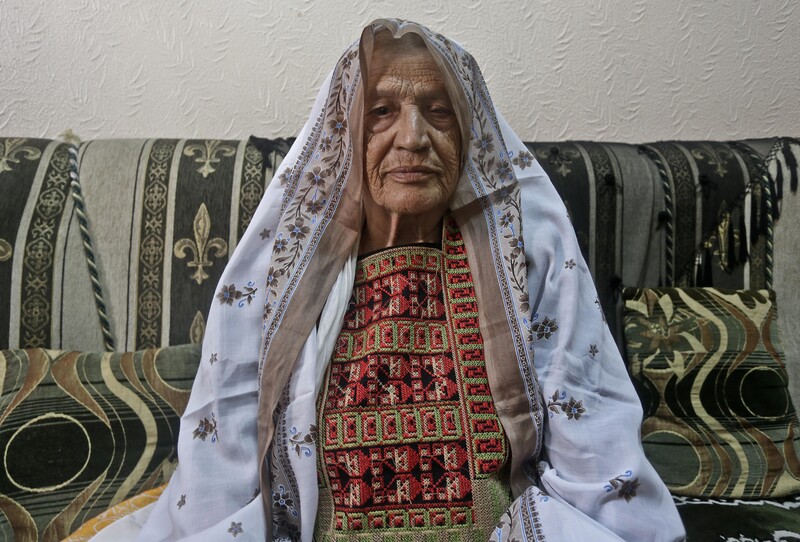
Amna Shaheen, 87, currently living in Gaza City, originally from Ni’ilya village near Ashkelon.
My grandfather Ibrahim was the village imam and taught children the Quran and some Islamic subjects. Girls, including myself, were of course not allowed to learn.
My father had livestock and I used to help my father. I had only one brother, who was sick.
I would chase away foxes which were always trying to get at our ducks. I used to bring some green leaves to feed the livestock, including some from our sycamore tree. My father also used to trade watermelon and we would store those watermelons under the tree.
It was when we heard the news of Deir Yassin that villagers began to flee. On the day the militants came to throw us out, I remember my cousin and I were washing potatoes.
Two months after we fled, my father was killed. By then we were living in the Jabaliya refugee camp in Gaza. He had bought two cows and was about to go and buy some straw and fodder for the cows. But at that time, Israeli military jeeps were on patrol and the soldiers began shooting. He was shot four times.
Even if they offered me hundreds of millions of dollars, I will not concede my right of return to my home in Palestine. What would I do with this money?
Reportage by Rami Almeghari and photo by Mohammed Asad

Ismail Hussein Abu Shehadeh, 92, originally from and currently living in Jaffa, near Tel Aviv.
Jaffa now is nothing. Before, the city was beautiful. It was called the “bride of the Middle East.” We exported oranges to the entire world. People came from all over to work here.
My father was a soldier with the Ottomans. He left in 1914 to fight in World War I. He came back by foot. That’s probably why he decided to stay when the Zionists attacked Jaffa. He did not want to flee again, and he prevented us from doing so. “Either you die here, or you flee and will feel the humiliation all your life,” he told us. He was begging people not to leave. Just 35 families stayed after the surrender, barely 2,000 inhabitants out of the 120,000 who were here.
In 1948, the attacks were brutal. The head of the city, Dr. Youssef Aked, gathered us to say that Jaffa was going to be under siege and that people had to choose between leaving and staying. Someone asked the doctor what he would do, and he said he would flee with his family. After that, many did, also because there was so much talk about what happened to Deir Yassin.
Only a few people in authority stayed. There was another meeting where it was decided to surrender on condition that there would be no destruction or looting. Representatives went to Tel Aviv with a white flag. The Zionists came with in a microphone and declared that Jaffa was now under Zionist authority. Then they entered and got greedy. They stole properties. We hid in the orchards for one month. Then people were put in the Ajami neighborhood, behind an electric fence. Some people died from starvation. But we managed to stay outside the fence.
Half of Jaffa was demolished despite the Zionist promises. Abu Laban, the one who negotiated the surrender, went to complain but he was beaten up. They broke his ribs and he was sent back on a donkey. Then they started to target people. One person, who refused to leave the orchards, was killed.
After 1948, I married and I started to work in the Tiberias region for about six years. I was employed by Israelis to fix motors or get the water for new Jewish communities. I was the only Palestinian there. We kept our relations professional. My wife and newly born children were struggling for food, and for a period, I was only going back to Jaffa once a month.
My job ended when the electricity came. I worked in a factory in Jaffa, fixing motors, but in 1956, some Jewish workers assaulted me because of the Israeli defeat in Suez so I quit. I later had a mechanics shop in the harbor, and tried to be a fisherman but without success. In 1982, the Israeli state started to ask for taxes and more papers. I had to sell everything. Finally I opened a grocery shop but I eventually had to stop for health reasons.
Reportage and photo by Anne Paq
–
Rami Almeghari is a journalist and university lecturer based in Gaza.
Mohammed Asad is a photojournalist based in Gaza.
Anne Paq is a French freelance photographer and member of the photography collective ActiveStills.
Source: https://electronicintifada.net/content/stories-catastrophe-palestine/24296?
Disclaimer: We at Prepare for Change (PFC) bring you information that is not offered by the mainstream news, and therefore may seem controversial. The opinions, views, statements, and/or information we present are not necessarily promoted, endorsed, espoused, or agreed to by Prepare for Change, its leadership Council, members, those who work with PFC, or those who read its content. However, they are hopefully provocative. Please use discernment! Use logical thinking, your own intuition and your own connection with Source, Spirit and Natural Laws to help you determine what is true and what is not. By sharing information and seeding dialogue, it is our goal to raise consciousness and awareness of higher truths to free us from enslavement of the matrix in this material realm.
 EN
EN FR
FR

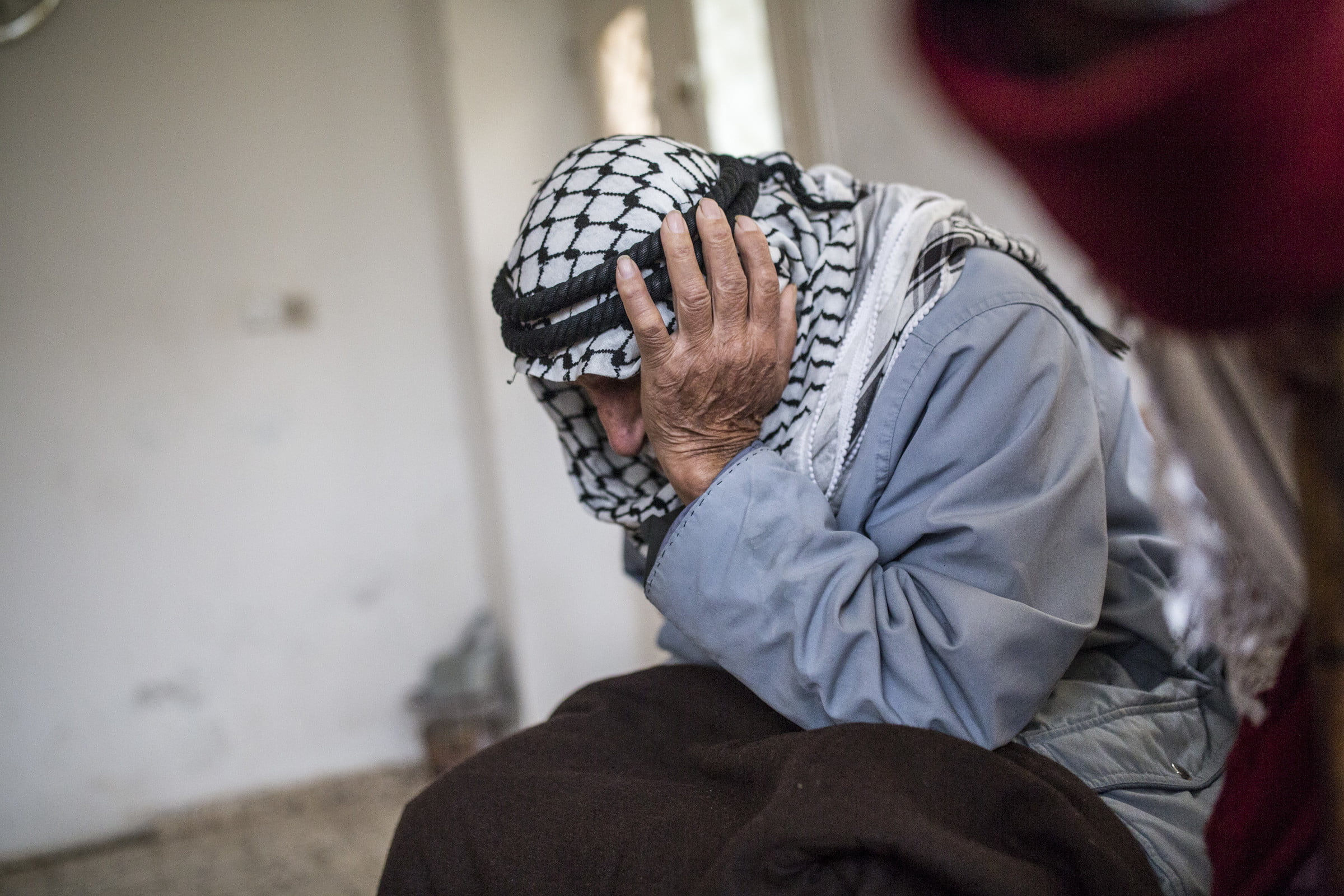

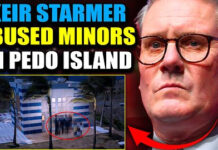
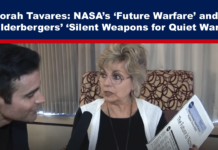
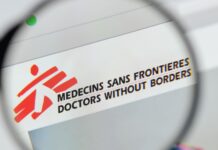
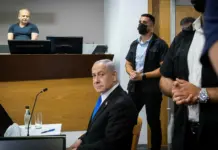
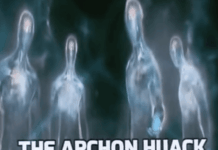
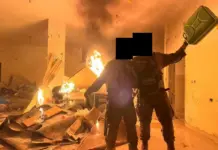
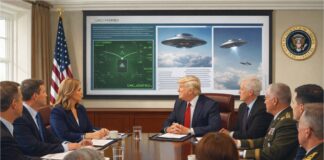

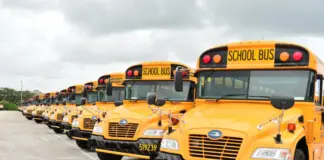

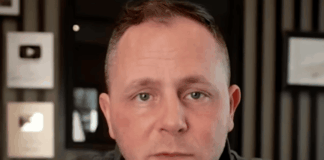
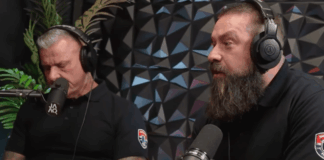












What is interesting is the story is based on actions that occurred in 1948. This is the year the Israel state was created.
Palestine, as nomads and natives of many areas throughout this region, did not establish nor create their home until 1988. The Palestine state was created in 1988.
So who is right and who is wrong? Both were refugees and yet we do have a Bible indicating the people of this region. Who are the true people of this region? Why do the people of this region struggle with unity? They struggle because they are being instigated by false forces not for their greater good. Peace begins with the people not politicians and leaders.
I see black ops infiltrations within the palestinian protest. Who is funding these events and creating dissension instead of working together? Soros, perhaps, among others. It is the people I hold responsible for war on both sides.
Just like America and the 2 party system divides the weak vs the meek and awakens the meek that shall inherit the Earth…